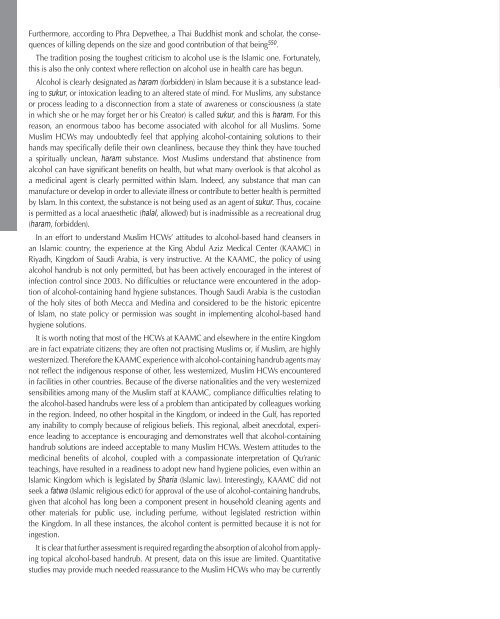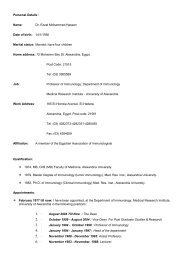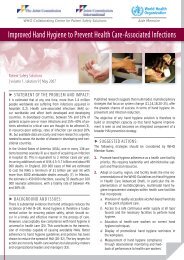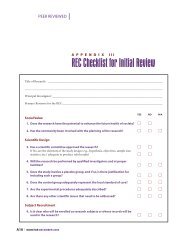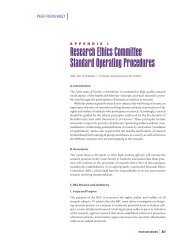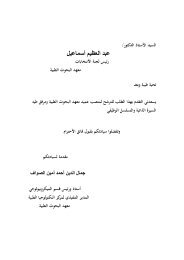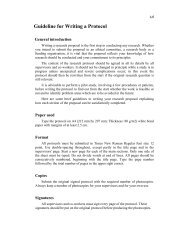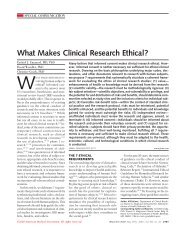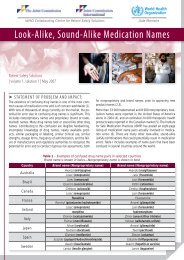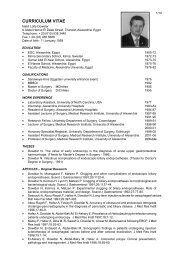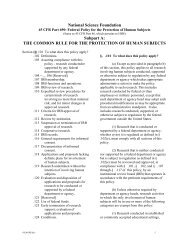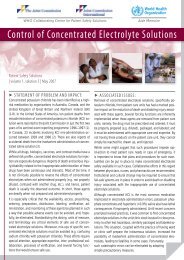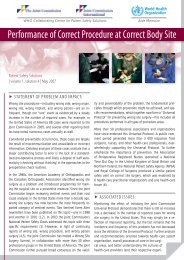Hand hygiene.pdf
Hand hygiene.pdf
Hand hygiene.pdf
You also want an ePaper? Increase the reach of your titles
YUMPU automatically turns print PDFs into web optimized ePapers that Google loves.
Furthermore, according to Phra Depvethee, a Thai Buddhist monk and scholar, the consequences<br />
of killing depends on the size and good contribution of that being 550 .<br />
The tradition posing the toughest criticism to alcohol use is the Islamic one. Fortunately,<br />
this is also the only context where reflection on alcohol use in health care has begun.<br />
Alcohol is clearly designated as haram (forbidden) in Islam because it is a substance leading<br />
to sukur, or intoxication leading to an altered state of mind. For Muslims, any substance<br />
or process leading to a disconnection from a state of awareness or consciousness (a state<br />
in which she or he may forget her or his Creator) is called sukur, and this is haram. For this<br />
reason, an enormous taboo has become associated with alcohol for all Muslims. Some<br />
Muslim HCWs may undoubtedly feel that applying alcohol-containing solutions to their<br />
hands may specifically defile their own cleanliness, because they think they have touched<br />
a spiritually unclean, haram substance. Most Muslims understand that abstinence from<br />
alcohol can have significant benefits on health, but what many overlook is that alcohol as<br />
a medicinal agent is clearly permitted within Islam. Indeed, any substance that man can<br />
manufacture or develop in order to alleviate illness or contribute to better health is permitted<br />
by Islam. In this context, the substance is not being used as an agent of sukur. Thus, cocaine<br />
is permitted as a local anaesthetic (halal, allowed) but is inadmissible as a recreational drug<br />
(haram, forbidden).<br />
In an effort to understand Muslim HCWs’ attitudes to alcohol-based hand cleansers in<br />
an Islamic country, the experience at the King Abdul Aziz Medical Center (KAAMC) in<br />
Riyadh, Kingdom of Saudi Arabia, is very instructive. At the KAAMC, the policy of using<br />
alcohol handrub is not only permitted, but has been actively encouraged in the interest of<br />
infection control since 2003. No difficulties or reluctance were encountered in the adoption<br />
of alcohol-containing hand <strong>hygiene</strong> substances. Though Saudi Arabia is the custodian<br />
of the holy sites of both Mecca and Medina and considered to be the historic epicentre<br />
of Islam, no state policy or permission was sought in implementing alcohol-based hand<br />
<strong>hygiene</strong> solutions.<br />
It is worth noting that most of the HCWs at KAAMC and elsewhere in the entire Kingdom<br />
are in fact expatriate citizens; they are often not practising Muslims or, if Muslim, are highly<br />
westernized. Therefore the KAAMC experience with alcohol-containing handrub agents may<br />
not reflect the indigenous response of other, less westernized, Muslim HCWs encountered<br />
in facilities in other countries. Because of the diverse nationalities and the very westernized<br />
sensibilities among many of the Muslim staff at KAAMC, compliance difficulties relating to<br />
the alcohol-based handrubs were less of a problem than anticipated by colleagues working<br />
in the region. Indeed, no other hospital in the Kingdom, or indeed in the Gulf, has reported<br />
any inability to comply because of religious beliefs. This regional, albeit anecdotal, experience<br />
leading to acceptance is encouraging and demonstrates well that alcohol-containing<br />
handrub solutions are indeed acceptable to many Muslim HCWs. Western attitudes to the<br />
medicinal benefits of alcohol, coupled with a compassionate interpretation of Qu’ranic<br />
teachings, have resulted in a readiness to adopt new hand <strong>hygiene</strong> policies, even within an<br />
Islamic Kingdom which is legislated by Sharia (Islamic law). Interestingly, KAAMC did not<br />
seek a fatwa (Islamic religious edict) for approval of the use of alcohol-containing handrubs,<br />
given that alcohol has long been a component present in household cleaning agents and<br />
other materials for public use, including perfume, without legislated restriction within<br />
the Kingdom. In all these instances, the alcohol content is permitted because it is not for<br />
ingestion.<br />
It is clear that further assessment is required regarding the absorption of alcohol from applying<br />
topical alcohol-based handrub. At present, data on this issue are limited. Quantitative<br />
studies may provide much needed reassurance to the Muslim HCWs who may be currently


